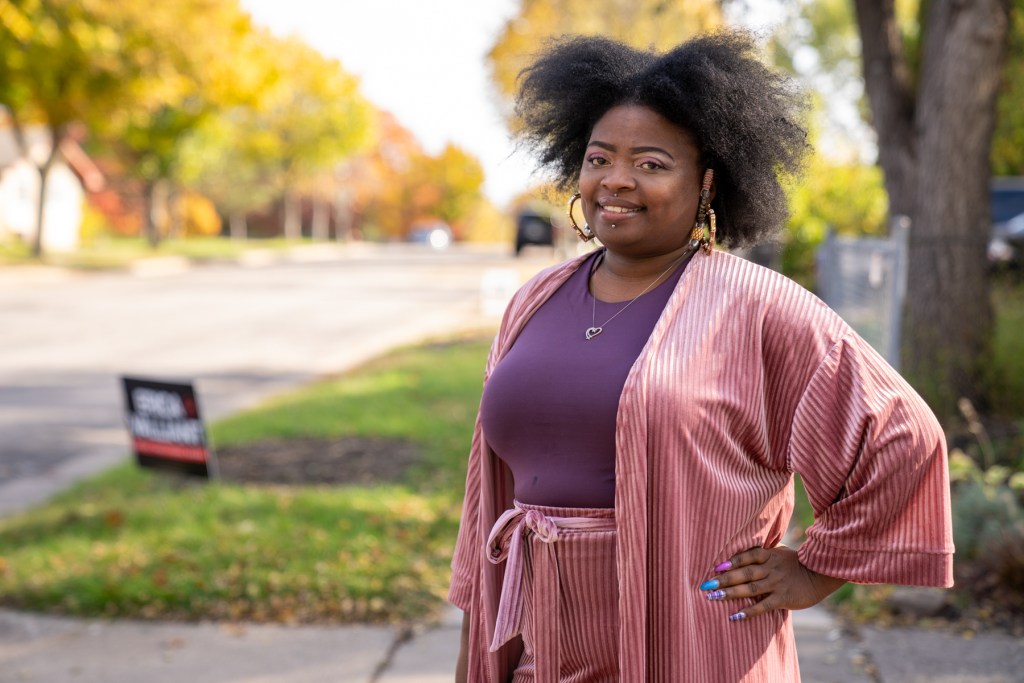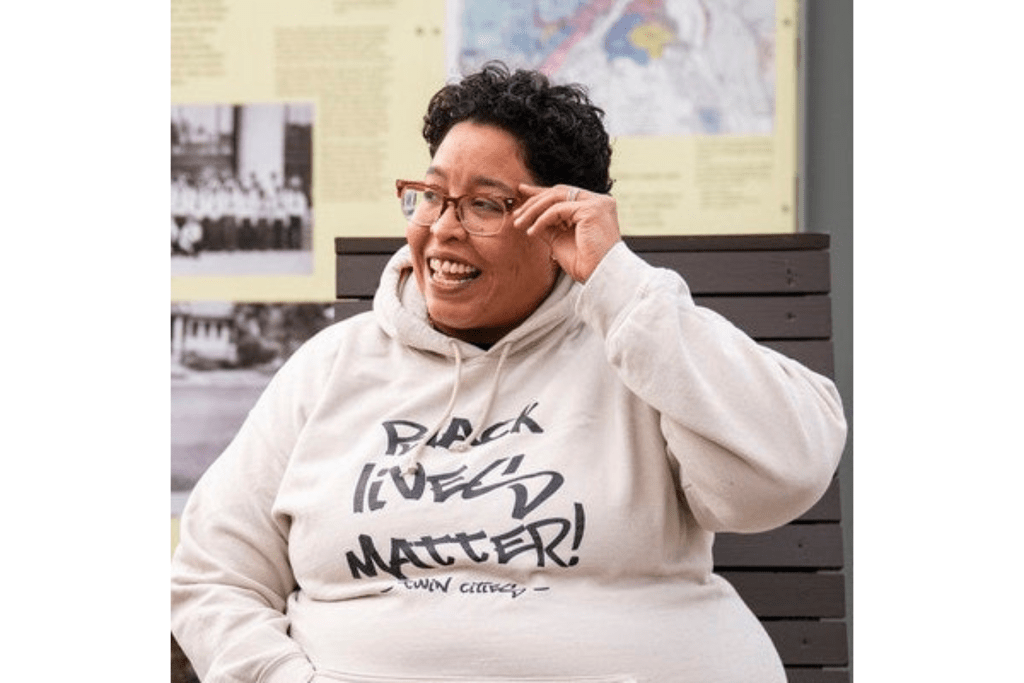Sahan Journal interviewed all seven St. Paul school board candidates: Chauntyll Allen, Yusef Carrillo, Zuki Ellis, Carlo Franco, Abdi Omer, Erica Valliant, and Gita Rijal Zeitler. Voters can choose four.
Name: Zuki Ellis
Age: 49
Current day job: Grad student, master’s in advocacy and political leadership program, Metro State University
Kids in district: A 10th-grader
Neighborhood: Frogtown
Zuki Ellis grew up in St. Paul’s Rondo neighborhood. Like her father before her, she attended St. Paul Public Schools.
“My roots in St. Paul are deep,” she told Sahan Journal. “This is the community that I’ve been raised in.”
In her two terms on the school board, she said, she has gotten to know the complexity of the school district and built many relationships. She likes to spend time in district schools and connecting with community members who may be affected by school board decisions, she said. “This work is very relational,” she said. “I do not take it lightly.”
Ellis got involved with education advocacy through a college internship with the teachers’ union, then called the St. Paul Federation of Teachers. She has also served on the board of Protect Minnesota, a gun-violence prevention organization, and Friends of Oxford Pool, which funds swimming lessons for children whose parents cannot afford them.
This interview has been edited for length and clarity.
Why are you running for reelection to the St. Paul school board?
I had what I thought was four years of learning during my first term. There’s a lot to learn in the district. My second term was really disrupted by the COVID-19 pandemic. I had to learn how to be a school board member virtually while our kids were in distance learning, trying to define what learning and education were in St. Paul. It’s still impacting me. And then thinking about what the potential opportunities are in the next four years for St. Paul Public Schools. The impacts of the pandemic are going to be with us in education for the foreseeable future. I feel like experience on the school board is needed, and so I felt compelled to continue.
In 30 seconds or less, why should voters choose you?
I have been on the school board for two terms. I’m not brand new to this. There isn’t going to be the same learning curve for me. I have held leadership roles in our community in St. Paul Public Schools and other organizations that we partner with. I’ve worked hard to build relationships within community, internally and externally in St. Paul Public Schools. This is the district that I grew up in, that I graduated from. This is my community. I’m invested in it in 1,001 different ways. I have love for our community, and I would like to see it thrive and be better. And I think that my voice will be helpful for St. Paul Public Schools and our young people.
List three things you think are going well in St. Paul Public Schools.
I’m really excited about the work that we’re doing with literacy. I’m really excited that we’re being innovative in the opportunity with the community to open the East African magnet school. Third, I think we’re starting to build community trust again. I’m in our schools quite a bit, and at some of our sites, enrollment numbers are increasing from what was projected. That benefits us going forward.
St. Paul Public Schools has historically seen many kids from immigrant families leave the district for charter schools. What do you think the district is doing well to attract and retain immigrant families, and how should it improve?
The great thing about St. Paul is that we have schools that fit every child in St. Paul. That’s honestly what I believe. Some missed opportunities for us—we’re not talking about the district in that way. It doesn’t matter where you are in the city, there’s a school in St. Paul for you. For our families who may be new in navigating St. Paul Public Schools, it’s a lot of choice. And that can be really overwhelming in a new place. The opportunity that we have, that we’ve been growing on, is this partnership of listening to what our families want. It’s not the easiest thing to navigate, but we have built really good partnerships to help our families within communities figure out which options of schools are available to them based on where they live. We have interpreters at our placement center who speak multiple languages. Communication is key. And if you’re not clear about what we offer, it makes it harder for families to navigate.
Last year, the district saw a few very scary incidents at schools—including one high school student fatally stabbing a classmate. What do you think the district is doing well in regards to school safety, and what does it need to do differently?
Right now, St. Paul Public Schools has school support liaisons in middle and high schools, and the number of school support liaisons has increased in our high schools. We are currently discussing the need to possibly include them in some elementary schools. We do not currently have school resource officers in St. Paul Public Schools, but we do have a partnership with the St. Paul Police Department. That’s necessary. That is a relationship that hasn’t ended. I believe that our school support liaisons are well trained, and they are building relationships with our young people, which is really key when we’re talking about how we are all working together to feel safe and welcome. All of those things are really important and cannot be discounted.
What’s another issue that would be a priority for you on the school board, and how would you approach it?
Access to relevant courses and experiences that support the things students are interested in for a successful future. I’d like to think about how we have unique cultural and racial experiences to create a more inclusive St. Paul Public Schools. I’m in conversations with our young people, trying to hear more from them about their school experience and what they would like to see in their schools. I’d like to see us deepen relationships within our community for service opportunities for our young people. They’ve learned a lot technology-wise, but experiencing our community and building skills is where we need to be headed when we’re thinking about career and college pathways.
What are you proud of from your service on the school board so far?
I am really proud of the critical ethnic studies graduation requirement course that rolled out in its entirety last school year. Every 10th-grader in St. Paul Public Schools last year took the critical ethnic studies course. That work started during my first term. It was work done with community and families, most specifically, our Hmong parent advisory committee. My son is taking that course right now. To have seen its beginning, and then to see our students host their first critical ethnic studies capstone project, talking about what they learned and the impact that it had on them, that was pretty powerful.










